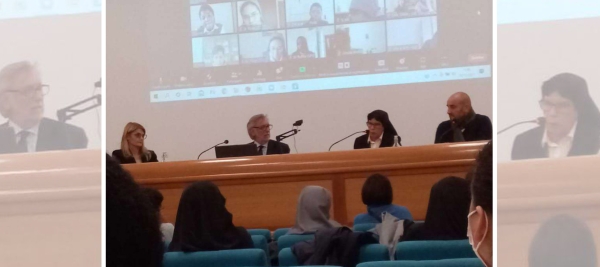Last November 18 at the national headquarters of USMI (Italian Major Women Superiors Union) on Via Zanardelli in Rome, Sister Emma Zordan enriched the formation course for novices with her testimony. There were about forty present in the main hall and many others connected remotely. Sr. Emma has been volunteering for more than seven years at the Roman prison, offering creative writing workshops. She recounted the path that led her to the Rebibbia Prison. Her restlessness, courage and strength she found after passing through the prison gates and the many other opened and closed bars before she got to the penal section where she would carry out her volunteer work. Last November 18 at the national headquarters of USMI (Italian Major Women Superiors Union) on Via Zanardelli in Rome, Sister Emma Zordan enriched the formation course for novices with her testimony. There were about forty present in the main hall and many others connected remotely. Sr. Emma has been volunteering for more than seven years at the Roman prison, offering creative writing workshops. She recounted the path that led her to the Rebibbia Prison. Her restlessness, courage and strength she found after passing through the prison gates and the many other opened and closed bars before she got to the penal section where she would carry out her volunteer work. For several years she had been living in Latina where she was in charge of the St. Gaspar community of 29 elderly sisters, but each Saturday morning at eight she was unfailingly there at Rebibbia, with packets for her detainee friends. She openly says it to the sisters who were carefully listening: “That is now my family!” And in truth she is friend, mother and sister to many inmates. Even a small gesture like bringing them some candy has great meaning for them. It is like a caress of the soul.This was confirmed by the other protagonist at the USMI meeting: Carmine C., a prisoner on probation after 16 years in various penal institutions. She was among the first to meet the Religious volunteer at Rebibbia and to collaborate with her. It was precisely the discussion between the two, at times intense, other times playful, that allowed those present to “experience” the harshness of prison life and how important it is to have the presence of someone from “outside” who knows how to listen, and show affection, attention and hope. The instrument of this process was S. Emma’s “creative writing workshop.” In her talk, she retraced the stages of this work, recalling the titles of the books that have gathered the testimonies of the inmates. She then went on to present the book “Not Everyone Knows … the Voice of Rebibbia’s Inmates” which was the other reason for the meeting. The instrument of this process was S. Emma’s “creative writing workshop.” In her talk, she retraced the stages of this work, recalling the titles of the books that have gathered the testimonies of the inmates. She then went on to present the book “Not Everyone Knows … the Voice of Rebibbia’s Inmates” which was the other reason for the meeting. The book offers some testimonies of the inmates on hope, gathered before and during the pandemic. Journalist Roberto Monteforte, who collaborated with Sister Emma in the realization of the book, explained the reason for this choice. “The testimonies are offered to those outside the bars, to common people who are considered “free” and yet who are too often prisoners of their own prejudices that make them incapable of accepting. On this point, lawyer Antonella Pacifico, also involved by Sr. Emma in the “prison writing workshop” project, intervenes. She does so by recalling the “fear of the aftermath” expressed by many inmates. “Worrying is the violence outside the prison, made up of prejudice and precautions. So is the punishment you never finish serving because, she underlines by quoting from one of the book’s testimonies,” the stigma of a prisoner is imprinted like an indelible brand on your skin.” Why shouldn’t the sentence ever end? Why should the innocent family of the one serving the sentence pay as well? How does one deal with the aftermath? Once out, what will be the social reintegration of the inmate? The theme is present in every part of the world and involves the novices who came to Rome from every part of the world. The strong testimony is an appeal launched by Sister Emma. “We are too few. Come to give your faith witness in serving inmates. “ How many rosaries they ask me for!” she added. And I invite them to pray the Our Father.” Because you can evangelize in this way as well: offering a listening ear and friendship. The testimony of Carmine was moving. She recounted her dialogue with the Crucified Lord during nights of loneliness in her cell. “I pray to him, we talk, I confide in him, we argue….” Sister Rosanna Costantini, in charge of the formation area of USMI, had already emphasized this at the beginning of the meeting. Mission today is offering witness in concrete life, in love for the least, as Pope Francis taught us when he celebrated his first Holy Thursday not at the Vatican but in Casal de Marmo juvenile prison, washing the feet of the young inmates. This is the outgoing Church serving the excluded. Some assured that they would ask the mother general of their own Congregation for the opportunity to follow the path indicated by Sister Emma. That’s when a testimony touches the heart! One might say that one goal has been reached. But the hardest thing remains: touching the hearts of those accustomed to pre-judging without compassion and helping them discover fraternity. This is the purpose of the book Not everyone knows … – helping people to understand and know so that we can all be more human.
Roberto Monteforte
